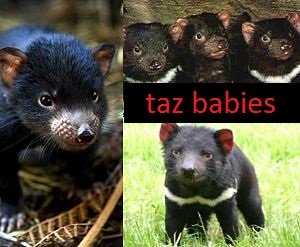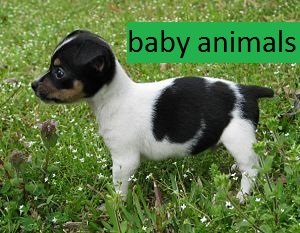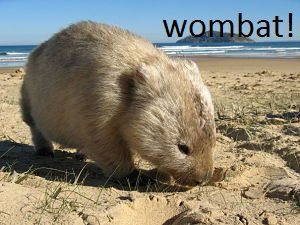Corgi Puppies
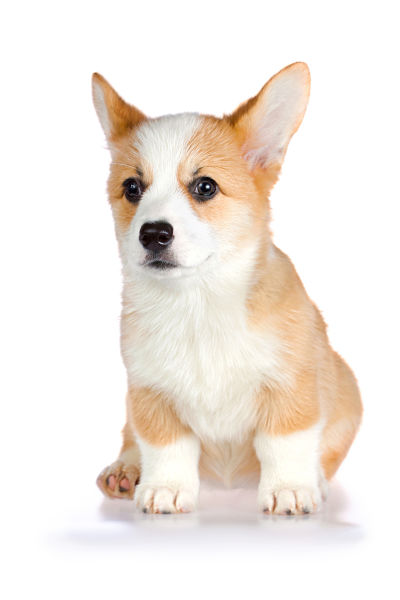 Portrait of a Corgi Puppy - Pembroke
Portrait of a Corgi Puppy - PembrokeCorgi puppies are low-set, sturdy, active little dogs.
They were originally bred as herding dogs so they are swift, independent and intelligent.
Corgi puppies are highly trainable and very eager to please. They are outgoing, friendly and adaptable to country as well as city living.
This is a breed that does very well if you have a changing lifestyle, are on the road, or move often.
Nothing phases them!
They also thrive on being busy, learning new things, and exploring outdoors.
Remember, Corgi puppies were bred to herd sheep and cattle, so they are tireless and fearless.
They can get 1,000 pound animals to go exactly where they want them to by nipping at their heels.
This is a dangerous job when your only about 25 pounds full grown!
The Corgi comes in two varieties - Cardigan and Pembroke.
Cardigan Welsh corgi puppies are the larger of the two breeds. They can grow to be 12 inches at the shoulder and weigh 26 to 38 pounds.
They have very long backs and long tails, and are broad with large, fleshy paws and big bones.
Pembroke Welsh corgi puppies are the smaller ones. They can be about 10 inches at the shoulder and average 20 to 25 pounds.
Pembroke corgis have shorter backs than Cardigans and they are either born with no tail, or their tails are docked at 2 or 3 days old.
Pembroke corgi puppies have a finer, more foxy muzzle and much smaller feet and ears.
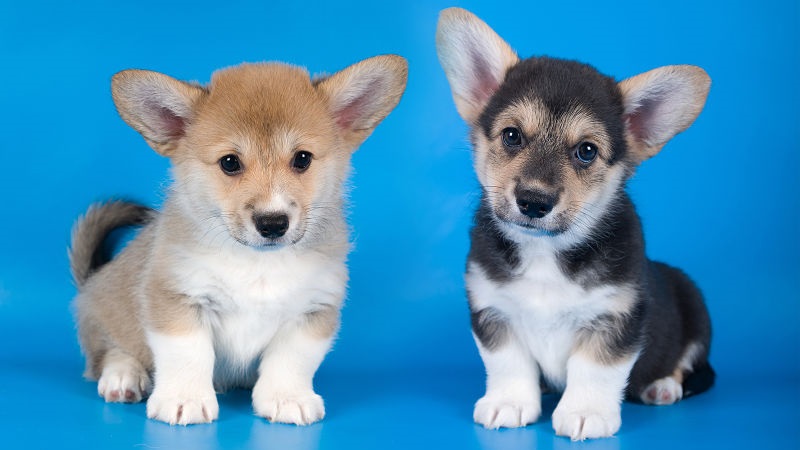 Cardigan Welsh Corgi Puppies
Cardigan Welsh Corgi Puppiestraining Corgi puppies
Corgi puppies weigh about 8 pounds when they are eight weeks old. They grow quickly, gaining about a pound a week, and are almost full grown by the time they reach 6 or 7 months of age.
They start out with their ears flopped over, but the ears should be fully erect at 11 or 12 weeks.
Sometimes the ears go through phases, standing up and then flopping over for a few days before finally standing up .
Corgi puppies should be kept away from stairs, and particularly be prevented from going down stairs, because this may harm their developing backs and front legs.
The corgi is a herding breed, called a drover, which instinctively attempts to collect and herd both animals and people.
They control the herds movements by occasionally nipping at the heels and sometimes the flanks of cattle.
They are fearless and relentless in this endeavor, risking being kicked, stepped on and even killed.
Because these are habits have been bred into the corgis mentality, it is critical that you teach your corgi puppy very early on.
Do not allow them to chase and nip children, bike riders or other dogs.
Early correction will control these urges, and keeping these dogs busy minds engaged will give them an outlet for their herding drive.
a few more facts about Corgi puppies
- The Corgi is a herding breed
- The Queen of England keeps corgis
- There are two varieties of Corgi puppy
- The Cardigan Welsh corgi is 10 to 12 inches, 25 to 38 pounds
- The Pembroke Welsh corgi is 10 to 12 inches, 24 to 27 pounds
- The Pembroke has no tail
- Corgis come in all colors
- Corgis are very high shedding
see more Puppies!!!
Recent Articles
-
African Animals - Animal Facts Encyclopedia
Oct 11, 16 10:27 PM
African Animals facts photos and videos..Africa is a wonderland for animal lovers, and a schoolroom for anyone who wants to learn about nature, beauty and the rhythm of life -
Baboon Facts - Animal Facts Encyclopedia
Oct 11, 16 10:26 PM
Baboon facts, photos, videos and information - Baboons are very distinctive looking monkeys with long, dog-like snouts and close set eyes. -
Great Apes Facts - Animal Facts Encyclopedia
Oct 11, 16 10:25 PM
Great apes facts, photos and videos..Human beings did not evolve from chimpanzees, modern chimps and gorillas do not appear in the fossil records until much more recently than homo sapiens..

